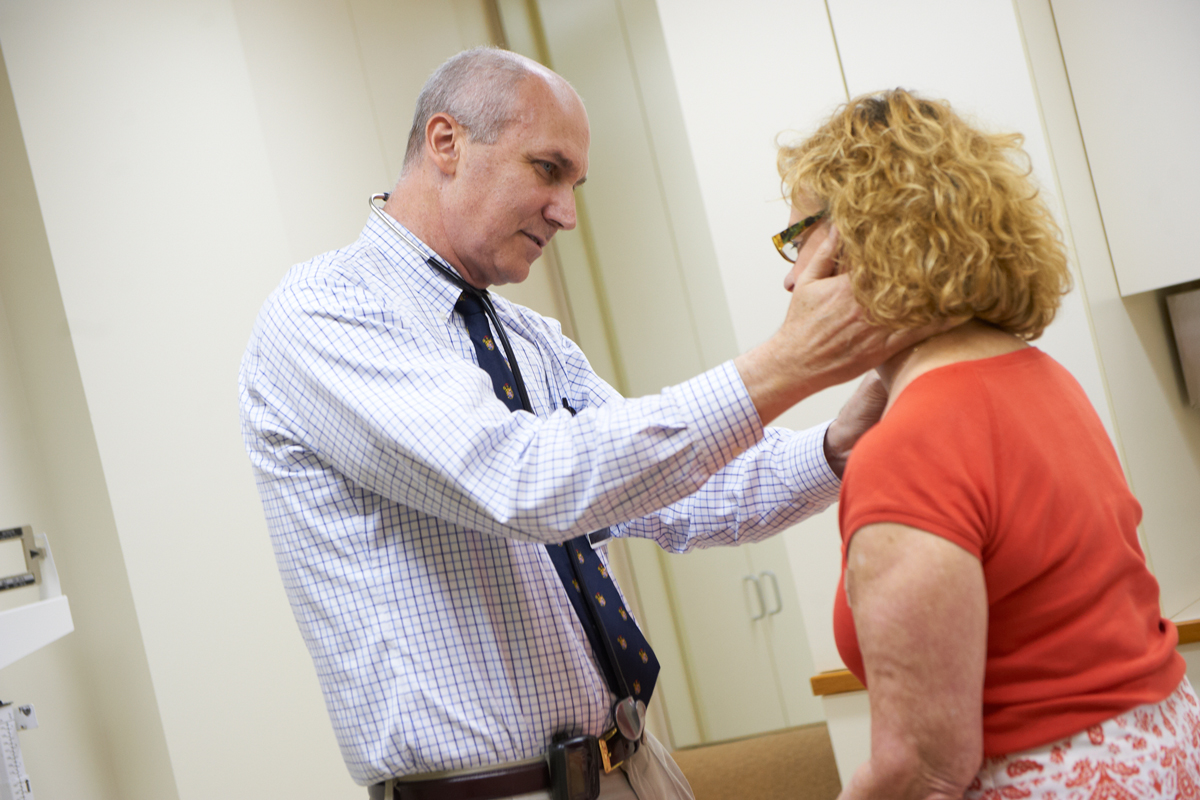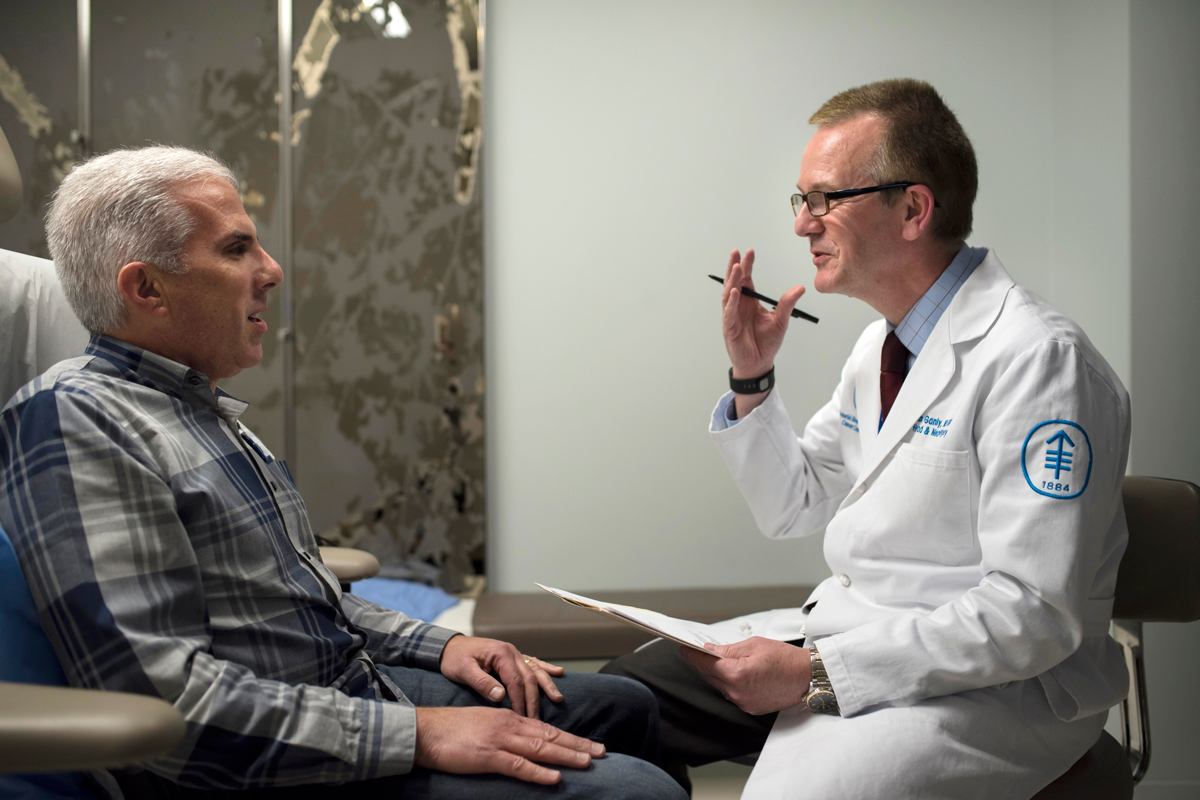
If you or someone you care about has been diagnosed with a head and neck cancer, you may face a lot of difficult questions. Where should you go for care? What are your treatment options? How can you keep your quality of life?
Reading this guide is a good place to begin finding answers. From here, you can visit other sections of our head and neck cancer guide for more in-depth information.
What is Head and Neck Cancer?
Head and neck cancer is a general term used by doctors. It describes the diverse group of malignant tumors that can occur in the head and neck region. Examples include:
- Laryngeal cancer
- Mouth cancer
- Nasal cavity and sinus cancer
- Salivary gland cancer
- Skin cancer
- Throat cancer
- Thyroid cancer
- Tongue cancer
Benign (noncancerous) growths can also form in the head and neck region. Examples include parathyroid tumors as well as tumors in the salivary glands.
Treatment for Head and Neck Cancer

The typical treatment for head and neck cancer is surgery. Some tumors can be removed with minimally invasive procedures. These include laser microsurgery, robotic approaches, and Mohs surgery.
Other times, head and neck cancer operations can be very complex. They require careful preparation and planning. MSK’s surgeons may use specialized techniques to preserve your appearance and key functions, such as speech and swallowing. That’s why head and neck cancer is best treated by doctors who are board certified in head and neck surgery and have extensive experience treating cancer.
Radiation to the head and neck can cure many people with the disease. Radiation oncologists use many highly advanced technologies to treat head and neck cancer.
Among the most effective treatments for head and neck cancer are intensity-modulated radiation therapy and proton therapy. These specialized approaches can help prevent side effects, including those that affect your ability to eat or swallow.
Immunotherapy for Head and Neck Cancer
Immunotherapy is one of the most promising cancer treatments available today for people with advanced head and neck cancer. It uses the power of your own immune system to fight cancer. People who come to MSK for immunotherapy treatment benefit from the close collaboration between our doctors and scientists. We are constantly looking for new and better approaches.
Immunotherapy is not right for everyone. A clinical trial testing other new head and neck therapies may give you more options if the cancer has returned after standard treatment. Participating in a clinical trial may give you access to treatments that are not widely available elsewhere.
Learn more about drug therapies for head and neck cancer.
MSK physicians, nurses and other healthcare professionals are experts in head and neck surgery, radiation oncology, drug therapies, and more.
Genomic Testing for Head and Neck Cancer

In recent years, personalized medicine has begun to bring hope to people with cancer. People with stage III or stage IV head and neck cancer as well as those with recurrent head and neck cancer have new options.
Personalized medicine involves looking at cells obtained from a biopsy to see if there are any genetic mutations. These are changes in the genes that could be linked to the type of cancer you have.
Certain chemotherapy drugs are more effective than others against tumors with specific mutations. Molecular analysis of a tumor can help determine which therapies will most likely benefit you. This is also called genomic testing.
MSK offers a highly sophisticated genomic-sequencing test called MSK-IMPACT®. It is available exclusively to our patients. The test was designed by our researchers to sequence DNA. It identifies genetic mutations and other abnormalities associated with a specific cancer.
The information from MSK-IMPACT® can help us rule out treatments that may not work. In some cases, it helps us know whether to recommend cutting-edge clinical trials designed to target the mutations in an individual tumor.
HPV-Associated Head and Neck Cancer
Alcohol and tobacco use have long been linked to cancers of the head and neck. However, infection with the human papillomavirus (HPV) is quickly becoming a leading cause of the disease. HPV-associated head and neck cancers tend to form in the tonsils and other areas at the back of the throat.
The good news is that people with HPV-positive tumors often respond very well to treatment. HPV-positive head and neck cancer has a better prognosis than other forms of the disease. You may even be able to receive a less-intensive course of treatment. That can help prevent side effects without affecting the chances for a cure. If you have a head and neck cancer linked to HPV, it is important to find out whether you might be a candidate for a less-intensive treatment plan.
MSK Rare Head and Neck Cancer Programs
MSK’s doctors are experts in diagnosing and treating head and neck cancers, including very rare cancers. These head and neck cancers are so rare that few doctors have experience treating them.
That’s why it’s important to choose doctors who have treated many people with these rare cancers. Our rare head and neck cancer programs are led by experts in treating the kind of cancer you have.
Here’s a list of MSK’s rare head and neck cancer programs:
Rare Salivary Gland Cancer Program
This program treats rare salivary gland cancers. This type of cancer affects the glands in the mouth and other areas of the head and neck. Examples of these cancers are:
- Adenoid cystic carcinoma
- Salivary duct carcinoma
Program Director:
Alan Ho, MD, PhD
Head and Neck Oncologist and Cellular Therapist
Rare Thyroid Cancer Program
This program treats rare cancers of the thyroid. The thyroid is a small butterfly-shaped gland located below the voice box, in the front of the neck. Examples of these cancers are:
- Oncocytic carcinoma (also called Hurthle cell carcinoma)
- Anaplastic thyroid carcinoma
- Radioactive iodine refractory thyroid cancer
Program Directors:
Alan Ho, MD, PhD
Head and Neck Oncologist and Cellular Therapist
Eric Sherman, MD
Head and Neck Oncologist
Rare Skin Cancers of the Head and Neck Program
This program treats rare skin cancers that are not melanoma and often affect the head and neck. These cancers may have spread from where they started to nearby tissue or lymph nodes. This is called locally advanced cancer.
They may also have spread to parts of the body that are far away. This is called metastatic cancer.
Examples of these cancers are:
- Squamous cell carcinoma
- Basal cell carcinoma
Program Director:
Lara Dunn, MD
Head and Neck Oncologist
Why Choose MSK for Head and Neck Cancer Care?
At MSK, our goal is not only to save your life but to help you maintain your quality of life.
Our multidisciplinary team focuses exclusively on the treatment of head and neck cancer. More than 80 medical professionals are part of this group. The team meets weekly to discuss the care plan of each patient. Our experts consider every available treatment option and work together to come up with the best possible approach for each individual.
Choose MSK because we offer:
- Compassionate, leading-edge care from a team of head and neck specialists. Our staff includes head and neck doctors from many areas of expertise. These include surgery, proton therapy, innovative drug therapies, plastic surgery, and symptom management. Many of our head and neck doctors are nationally or internationally recognized in their field.
- Head and neck surgeons at the forefront of advanced surgical techniques. We are developing ways to preserve function and restore critical organs. We use minimally invasive techniques and are highly skilled in complex open surgeries.
- The latest head and neck cancer treatments, including new alternatives to traditional chemotherapy and radiation therapy that more precisely target cancer cells while sparing normal ones. Our doctors are leaders in developing innovative treatments that are more effective than standard therapies, and often safer, through our innovative clinical trials. Our radiation oncologists are highly experienced with the latest radiation technologies, delivering them in a way that maximizes your chances for a cure while minimizing side effects.
- Personalized treatment. We use state-of-the-art genetic testing and other tests to predict which treatments are likely to be most effective. Our head and neck oncologists are experienced with these tests and may be able to recommend a clinical trial based on the results.
- Expertise in treating HPV-related head and neck cancer. We offer specialized approaches to reduce the extent of treatment without affecting the chances of a cure.
- Dedication to the best possible outcomes and high patient satisfaction. Using our Face-Q questionnaire, we track patient satisfaction. We use the responses to continually improve our care.
- Great flexibility in how and where to receive treatment. Our specialists are conveniently located not just in Manhattan but also at our regional outpatient locations in New Jersey as well as in Westchester County and on Long Island in New York. This allows our patients to receive the same outstanding care from MSK’s doctors closer to home.
- A comprehensive program to support the well-being of every patient. We look after physical, emotional, spiritual, and other needs during and after treatment. Our doctors work with a team of specialists who address any needs that come up during the diagnosis, treatment, and survivorship of our patients.






